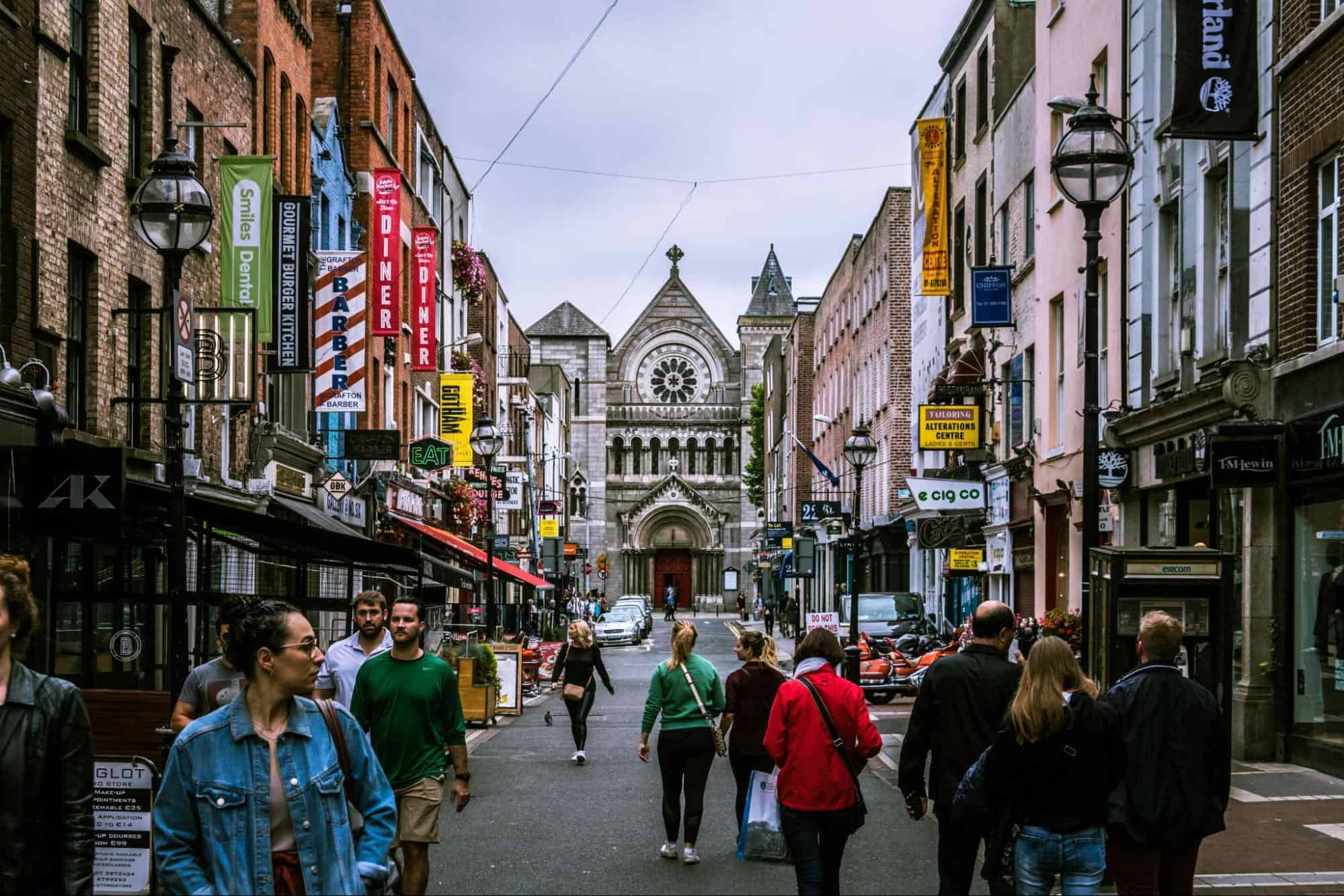Ireland: A Rich, First World Country
If you’re planning a visit or considering doing business in Ireland, you may be curious about its economic standing. In this article, we’ll dig deeper into some common questions, such as whether Ireland is a rich country and how it compares with other first-world countries.
Is Ireland a Rich Country?

Ireland is a rich country and here are the reasons why:
- Ireland has one of the highest GDPs in the world.
- The average citizen in Ireland earns a fairly high income.
- Ireland ranks 12th globally in overall prosperity.
- Ireland ranks 8th globally in health, education and income.
When we talk about a country’s wealth, we usually refer to its Gross Domestic Product (GDP) and Gross National Income (GNI) per capita. These metrics can give us an idea of how big a country’s economy is and how much the average Irish folk earns, respectively.
Ireland has one of the highest GDPs in the world

Simply put, a country’s GDP is the total value of all the goods and services produced within the country’s borders. In other words, it’s a measure of a country’s economic output.
Ireland’s GDP in 2021 was $504.18 billion, making it the 25th largest economy in the world according to the World Bank Group. That is a lot of money!
This means that Ireland produces a significant amount of goods and services compared to several other countries.
The average citizen in Ireland earns a fairly high income

GNI per capita is a measure of the total income earned by both the country’s residents and businesses, divided by its population. As others claim, this is a better way of measuring a country’s “richness” as it reflects the average income and standard of living of people in a country.
Ireland’s GNI per capita in the year 2021 was $79,370, a significantly higher number than the worldwide average of $18,508. These figures tell us that the average person in Ireland earns a fairly high income and enjoys a good standard of living.
Of course, this doesn’t mean that everyone in Ireland is wealthy or that people aren’t experiencing any financial challenges. But this does tell us that the Irish population is generally doing well financially compared to people from other countries.
Ireland ranks 12th globally in overall prosperity

GDP and GNI per capita may just be the tip of the iceberg! Because Ireland also earned a place among the world’s top-ranking economies in terms of global wealth indexes.
Let’s dig into the first one, the Legatum Prosperity Index.
This index measures a country’s overall prosperity, taking into account various factors such as economic performance, governance, education, health, safety, and personal freedom.
It’s also used by policymakers and business people around the world. So, we can say that this measure is a widely respected one.
So, how did Ireland fare in this measure? Ireland ranked 12th out of 167 countries in the 2021 Legatum Prosperity Index!
This means that Ireland is considered a prosperous country in general, with a strong economy, stable political environment, and a high standard of living.
Ireland ranks 8th globally in health, education and income

We’re talking about the other global wealth index, the Human Development Index (HDI).
The HDI is a widely recognized measure of a country’s development and takes into account economic, social and health related factors, all of which are critical aspects of human well-being.
It is released annually by the United Nations Development Programme (UNDP) and considers the population’s health (life expectancy), education and income.
So, how did Ireland fare? Ireland ranked 8th out of 192 countries in the Human Development Index for the year 2022!
So, it’s safe to say that Ireland is doing very well in terms of overall human development.
If those aren’t enough reasons to convince you, I’m not sure what will! All of the indicators we tackled point to a strong economy and a high quality of life in Ireland.
And although Ireland has had its share of shortcomings in the past, experiencing a severe recession from 2008 to 2012, the country had made a significant recovery and has seen steady economic growth, making it an attractive destination for visitors and investors alike.
To get a better sense of how well-off Ireland is, let’s make a little comparison. It’s a pretty logical thing to do, right?
How Does Ireland Compare to Other Rich Countries?

When comparing Ireland’s economy to other rich countries, the two most commonly used for comparison are the United Kingdom (UK) and the United States of America (USA). Here’s how Ireland fairs against these two wealthy countries:
- The USA and UK are richer than Ireland in GDP.
- Ireland is richer than the USA and UK in GNI per capita.
These countries share a lot in common with Ireland in terms of culture, language, and history, but their economies differ in several key ways. Let’s look further into each of the comparisons.
The USA and UK are richer than Ireland in GDP

Let’s look at the table below, which shows each country’s GDP for the year 2021.
GDP (Millions) 2021 Comparison
Clearly, Ireland has a much smaller economy compared to the USA and the UK. In this aspect, USA and UK are considered richer than Ireland.
But, if you look at the map, Ireland is a relatively smaller country compared to them. So, it makes sense that Ireland’s GDP is not as big as the USA and the UK’s.
Don’t forget that Ireland still ranks top 25th in terms of GDP, so it’s still doing great!
Ireland is richer than the USA and UK in GNI per capita

Now, let’s check out their GNI per capita in 2021.
GNI per capita 2021 Comparison
As you can see above, Ireland’s figure is actually higher than that of the UK and the USA. In this aspect, Ireland is richer than the USA and UK.
This is great news for the Irish people because it means they earn more money on average than people in the USA and UK!
One big factor that could explain this is Ireland’s low tax rate, which makes it an attractive destination for businesses from other parts of the world. Ireland also has a highly skilled and well-educated workforce, which further adds to its appeal to foreign investors.
And the good news doesn’t stop there. The country’s membership in the European Union (EU) also makes it an attractive location for companies looking to access the wider European market.
Overall, while Ireland’s economy may not be as large or wealthy as the UK or the USA, it has several unique strengths that make it an attractive location for business and investment.
Its open economy, highly educated workforce, and membership in the EU make it a strong contender in the global economy, despite its relatively small size.
Is Ireland a First World Country?

Today, the term “First World” is generally used to describe countries that are highly developed, with strong economies, advanced infrastructure, a stable political system, and high standards of living. By this definition, Ireland is a First World country.
In fact, it is classified as a developed country by the United Nations.
It used to focus primarily on agriculture, but it grew later on into one of the key players on the global stage. Now, it boasts a thriving tourism industry with plenty of tourist attractions, along with a booming tech industry and a solid financial sector.

It’s interesting how a lot of people imagine first-world countries to be all about skyscrapers and sleek, futuristic designs. When it comes to Ireland, things are a bit unique!
Instead of those, you’ll see a fascinating blend of modern and historical architecture, particularly in places like Dublin and Cork.
And if you are looking to take a break from the bustling urban life, you have many options for exploring Ireland’s natural wonders. You can go hiking, visit waterfalls, explore forests, take a stroll along the beach, and more.
How can travelers and businessmen benefit from Ireland’s wealth?

Knowing that Ireland is one of the richest country in the world opens up a range of opportunities for you. For businessmen:
- You can feel confident starting a business in a country with a strong and stable economy, high consumer spending, and purchasing power.
- You can count on a skilled, well-educated workforce for productivity.
- You can reap the advantages of having a diverse workforce since Ireland’s high standards of living attracts both domestic and international talents.
- You have higher chances of growing your customer base because:
- Irish consumers have more disposable income, which drives demand for goods and services.
- Ireland has connections within the EU
For travelers or first-time visitors:
- You can expect a well-developed tourism industry, with superb transportation and accommodations, and plenty of options for tourist activities and attractions.
- You can have a safe and enjoyable tourist experience since Ireland has a low crime rate (due to Ireland’s higher average income for citizens)
- You’ll get to experience the best products and services from a pool of talented and skilled individuals and a variety of established businesses.
So, whether you’re a tourist on a short or extended stay, or a business person exploring new opportunities, Ireland is definitely worth considering.
If you’re not convinced yet, maybe all that you need is to experience Ireland and see for yourself!
What is Ireland’s Currency?

Of course, you’ll need to know what currency to bring with you if you are planning to travel to Ireland. Ireland uses the euro (€) as its official currency.
If you know a bit of history, you might be very well aware that it used to have its own currency, the Irish pound or punt.
However, you don’t need to stress about exchanging your money for punts!
The euro is a highly traded currency on the global foreign exchange market and is widely accepted by merchants and businesses throughout Ireland and 19 other countries in the EU, namely:
- Austria
- Belgium
- Croatia
- Cyprus
- Estonia
- Finland
- France
- Germany
- Greece
- Italy
- Latvia
- Lithuania
- Luxembourg
- Malta
- Netherlands
- Portugal
- Slovakia
- Slovenia
- Spain
So, if you happen to come from any of the countries above, you can rest assured that using the euro in Ireland will be hassle-free for you.

